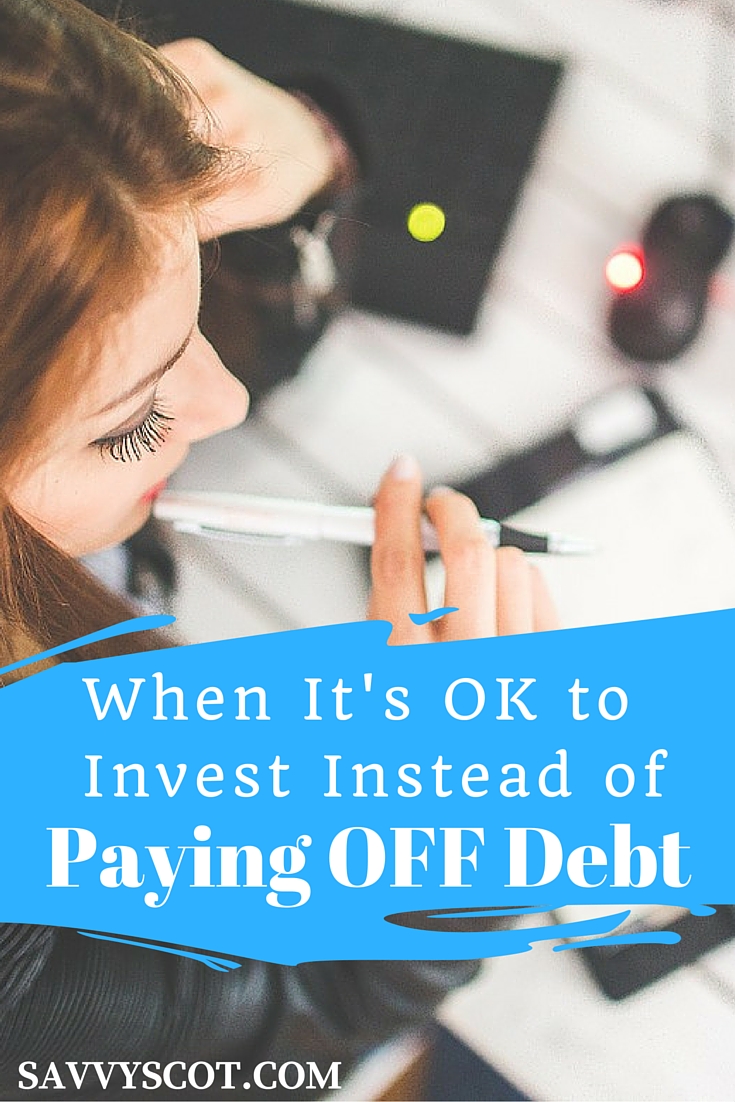This is a guest post from Kayla on behalf of ListenMoneyMatters.com. Kayla is a personal finance blogger in her mid-20s who loves to write about money topics of all kinds. Let me know if you would like to guest post on Savvy Scot!
When you have some debt to pay off, but you also know you need to invest for the future, it can be tough to decide which to do first. Believe me, I’ve been there! (I’m still there actually.)
Paying off debt is good, but you can get yourself in financial trouble if you put every penny toward debt instead of saving for emergencies or investing for the future.
In general, personal finance advice says you should pay off debt before you really get started investing, but I think there are some times when it’s ok to invest instead of paying off debt. Here are some times I would argue that investing is a better financial decision than paying off debt with every penny you have.
1. You’re Young with a Good Income
Being young is an advantage if you have a good income and want to invest. Even if you have some debt, it can sometimes be a good decision to invest rather than putting all of your money toward paying off debt. This is because time is on your side.
If your investments begin to lose money, you can always pull your funds out and reinvest your money elsewhere, or ride out the loss with the expectation of a greater return when the investment bounces back. Keep in mind this only works if the return on your investment is higher than the interest on the debt you are paying, so you shouldn’t focus on investing if you are in high interest credit card debt. But if your debt consists of low interest student loans, a car loan, or even a mortgage, it may be worth it to use some of your money for investing.
2. You Have an Employer Matched 401(k)
This is a no-brainer. You are receiving the gift of free money when your employer offers you the opportunity to invest in a 401(k) for your retirement and matches your investment up to a certain percentage. You should at least invest up to the percentage your employer will match. But how much more you should invest on top of that is up to you. In general, you should probably only invest the amount needed to get the full match until you are out of debt.
This investment money is withheld from your paycheck before you get it, so you won’t have to worry about trying to set the money aside yourself.
3. Your Investments Gain at a Higher Rate than Interest on your Debt
Again, if you have low interest debt, like a mortgage, you may be able to invest and earn a larger return on your money than you’d get by paying off your debt. This sounds like a good theory, but it’s wise to remember that you could end up losing some money in your investment account.
Making the decision about when it’s ok to invest instead of focusing solely on paying off debt should not be taken lightly. There are many factors you should weigh when making your decision, such as your income, your age, and how much risk you are willing to take on your investments. Think things through and run the numbers so you feel confident about the decision of whether to invest or focus only on paying off debt.
What other factors should be considered to help you decide when it’s ok to invest instead of paying off debt?
